EUROPE VACATION 2003

Luke watching the activity at Philadelphia International, awaiting the time when we will board our plane.
On the other end, after a layover in Frankfurt, we took the Roissy bus from CDG into Paris. It drops you in front of the Opera, which is a hub for the Metro and bus lines. We found the right Metro line, figured out how to use it, and boarded the 8 for La Tour Maubourg station. Then we lugged the luggage down past the Invalides, up side streets, and after a couple of unintended detours found Rue Cler and our hotel. Even the getting lost was a blessing, because it revealed lovely little coffee shops and other rewards. Among the first things Luke noticed were the minuscule "Smart cars," which he said look like a washing machine on wheels (they do, so long as you mean an American-sized washing machine).
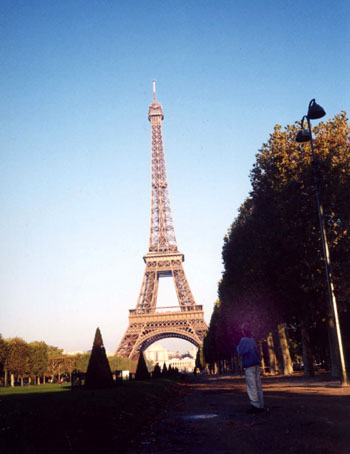
The Eiffel Tower on Wednesday morning. As you can see, we had excellent weather. On the ground beneath it, Arab or North African men sell cheap metal mini-Eiffel tower souvenirs, which they carry in bunches and jangle at the tourists like the chains of Marley's ghost.
For some reason unknown to science, I became a morning person in Europe: I got up at dawn every day, walking among the fruit vendors and butchers opening their stands and the bakeries setting out their croissants and the green-clad street-sweepers hosing down walkways. In little cafes I drank espressos among local working men and women preparing to start their days.

Most of my picture attempts from the observation deck didn't turn out well. But this one shows the Trocadero, with the shadow of the tower falling across it. You get a great view up there of everything in Paris -- except the Eiffel Tower. But what's a view of Paris without the Eiffel Tower?
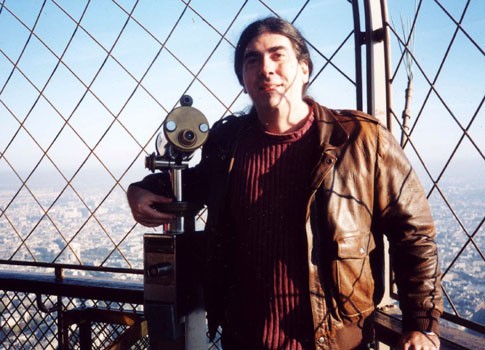
Luke took this picture of a large, ugly American on the observation deck. In America, it seems to me, a leather jacket acquires an aura if it looks like it's been worn by the kind of person who needs to wear a leather jacket -- a test pilot or a motorcycle rider or a lumberjack. My scruffy, lovingly aged brown bombardier's jacket has that quality. Never mind that it belonged to my little sister before I acquired it, and it acquired its scruffiness mostly from being scraped against the walls of various bars that she or I was staggering out of. It has that "American" ruggedness. But in Paris, black leather jackets are fashion statements. Mine just looks like something a street person plucked out of a trash bin. That combined with my long hair -- no adult male in Europe that I've seen has long hair, except rastafarians -- made me feel like a bum. I caught the wondering stares reflected in the train car windows.
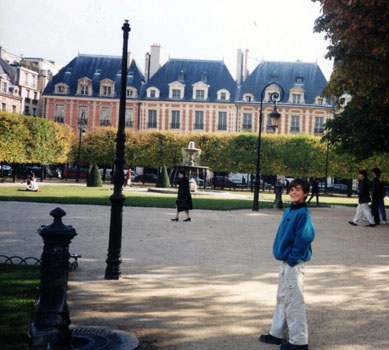
Luke in the Place des Voges, a fine square of palaces built in the early 1600s by Henry IV, and one-time home of Richelieu, Madame de Sevigné, Alphonse Daudet, and, much later, Victor Hugo (who wrote much of "Les Misérables" here). The complaint that the French are "rude" often comes from Americans who would walk away in disgust if someone walked up to them in their own neighborhood and asked them a question in Spanish. I don't find them rude, on the whole. Patient, rather, without being accomodating. And no wonder they feel superior; they live in such civilized circumstances: cities not gutted by crime and filth, monuments to ancient glories all around them, a literary tradition that stretches back millennia. They have ample evidence of being able to function as a society, and to live well. They make us Americans feel like barbarians simply by being themselves. They're not particularly trying to do it. The fact is, we are barbarians. Compared to Paris, the average American city is like a junior high school detention hall.
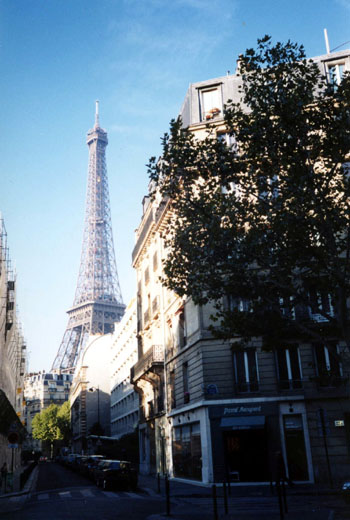
The view from Rue Cler, the street where we spent our first days in Paris. On the street, on the single block of our hotel, was a place that sells only fine olives. There's also one with teas, and one with nothing but cheese. There are two butchers, a newsstand, a vacuum cleaner shop, a bank, a wine shop, several produce stands and an excellent pastry place. People really do walk down the street happily munching on baguettes. Even the "supermarkets" are on a small scale, smaller than the average CVS store in America, and they fit into the neighborhoods and sell as much fresh stuff as boxes and cans. They're what would be left of a Lancaster County Giant store after you stripped out the two-thirds of it that are devoted to pretzels, potato chips, soda, and frozen desserts.

In a station of the Metro. One day we had traditional French accordion music in the Metro stop. Another time a trio of gypsies slipped into the car and entertained us on guitar and drums and vocals before passing the hat and slipping off three stops later. They did Gipsy Kings-type numbers and were quite good.

This doorway, which we passed near our hotel, is an extreme example of the fascinating architecture of Paris. Even in the more conservative late 19th century buildings, the design seems more organic than mathematical. It's as if the blocks were meant to be living hosts to human beings, not boxes to contain them. And in cases like this, the result is more like some delicate fossil than a mere building.
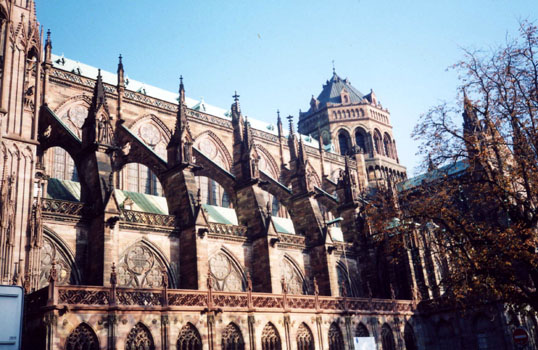
On to Strasbourg. Our flying buttresses arrive in one of my favorite cities on a cold, clear day. Paris thins out to suburbs, then coutryside. We're crossing the graveyard of a generation, the battlefields of World War I, but they look as placid as Gettysburg. We pass villages straggled along crooked roads, all the buildings of the same dull, dove-colored stone, walled around, with a Romanesque church in the center. Along the flat rivers and canals, trees stand thick with mistletoe like tumors. Then we ride into higher ground, Lorraine, with bell domes on the church steeples and more pines in the woods. Mile by mile, the houses grow more regular, more modular, more German.
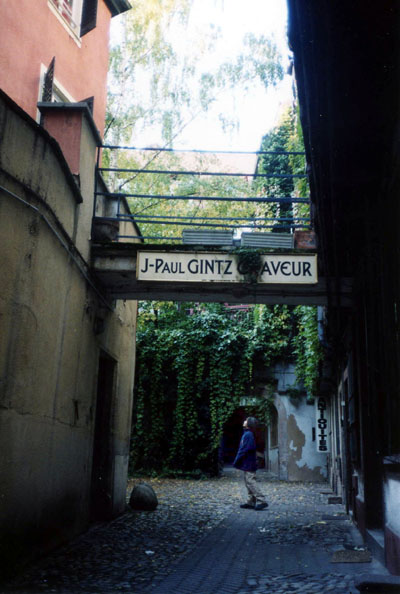
18 years ago, the last time I was in Strasbourg, I took a picture in a little alley that, by a combination of lighting and setting, became one of my favorites from my Europe trip. Amazingly, we found the spot again. Here's Luke admiring the trees.
We tell people we come from a place in the U.S.A. that's also called Strasburg. They hardly could be less interested.

Our hotel in Strasbourg. Here is a city, officially French and French-speaking, but thoroughly German in character and history. The architecture is German. The stained-glass windows in the cathedral are inscribed with Middle High German Bible verses. Even the women look German (a stylish German girl is as rare as an awkward French one). Modern Europeans claim to have outgrown their nationalism, their history of international conflict. There's a big brass plaque at the base of the Arc d'Triumph celebrating the return of Alsace and Lorraine to France in November 1918. I wonder what the reaction would be if Germany made the very logical suggestion that these regions now be put under joint sovereignty.
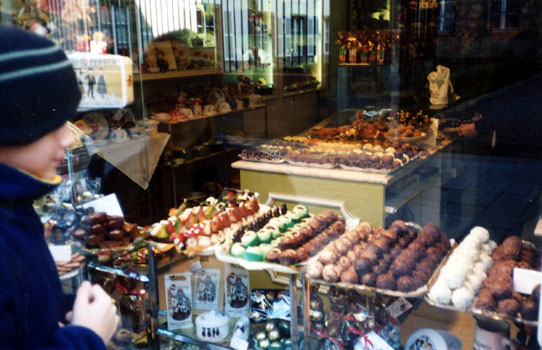
Alsatian pastries were some of the best food we encountered. Here Luke admires a shop window full of them. Some of the other wonderful food we had in France included duck roasted in honey sauce and lunch at an Auvergnois bistro in Paris which served roasted ham in hot goat's milk cheese with tomatoes and lettuce on toast.
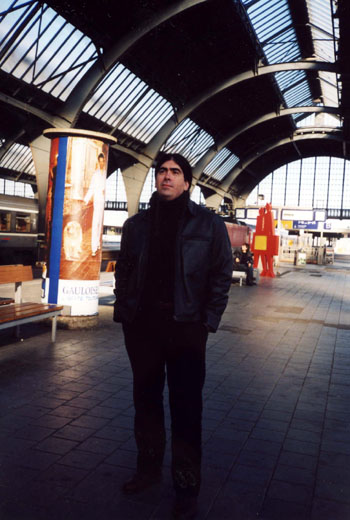
Ah, that's better. Outfitted like a true Parisian, with a stylish leather jacket and a scarf. This was taken in Karlsruhe train station, where we had an unexpected delay of a couple of hours on the way to Bavaria. It turned out to be a blessing; there was an outdoor zoo across the street, where Luke went in for the bargain price of 2 Euros and saw all kinds of animals while I relaxed in the sun on a park bench and wrote and drank coffee.
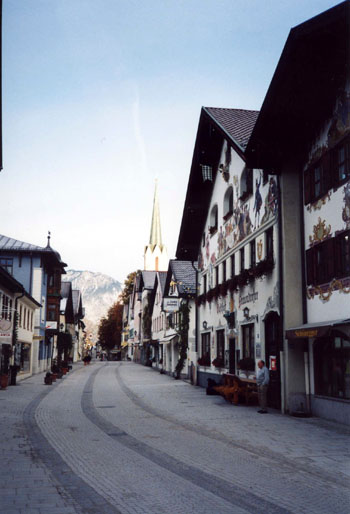
Our guest-house and its street in Partenkirchen. I have a tendency to call this place "Garmisch" for short, but I should break the habit. The lovely part of town, where we stayed in "Gasthof Frauendorfer," is the old Partenkirchen. The check-in is at the bar. At first I thought we'd wandered into a private reception by mistake. Every night, in here, the locals fill the long tables to sing and drink and dance. A sturdy little accordion player named Friedl Förstner takes the seat at the head of the room and performs traditional songs -- as he has every night except Tuesdays for 37 years. You see lederhosen. You see schulplatten dances. You drink big tankards of Munich beer. And there wasn't a tourist in sight, except us and two jovial, tipsy brothers from Minnesota. Together we regaled the owner with our Bad German, at the table off to the side where he thoughtfully seated us.
The people sing in harmonies. Förstner sings an old Vienna song full of sexual innuendos. You can tell it's a sex song because the women laugh first and loudest at it. As much as I admire Paris and long to feel that I belong there, I don't. Here, among the coarse, unglamorous Germans, fond of beer and music, I'm at home. And you sleep under big overstuffed comforters instead of blankets and sheets.

In a way I'm glad our trains were slow getting here, because we arrived well after darkness had fallen. I was awakened at 6 a.m. by drum beats out in the street. I got up and opened the window and watched a German band break into a tune as it passed. About 50 men in identical gray suits and bavarian hats, marching up Ludwigstrasse, playing a jaunty song of some sort, up into the hills. Then stillness and darkness again. I have no idea what that was about. But when I got up again at 8, the gray mass of the Kramerspitze (above) was emerging from the cold dawn. More snow had fallen, and it lay on our roof.
A few minutes later, when the sun was over the horizon, it looked like this. The air was still with a mountain silence. I flicked snow onto Luke's back until he awoke, and he got his first look at real mountains. Then he went back to bed. But I stayed up, leaning on the cold window, and watched the rock mass, the pinking clouds, the church steeple still lit under the brightening sky, red-tiled roofs, a breath of smoke from the chimney of the guesthouse next door ... and a lit window one floor below me (not shown in photo) that framed an obese, naked, hairy man sitting down to his breakfast. Ah, Germany.

Our second night at the gasthof, the only other tourists were two couples from elsewhere in Germany. They made much of Luke, as the only young person in the house. One guy offered to take him in as an apprentice and teach him cabinetmaking (he gave us a card). The woman in the other couple said she has a son his age, but he doesn't want to come to these evenings and hang out with old people. All he listens to is American pop music. Very few people in the room were younger than me. What will become of all this in 20 years?
I also realize that some people I know are going to read about this traditional Teutonic scene of dancing and singing and marching and come up with a specific image from 60 years ago. Well, what of it? The German love of pageants and songs and homeland is not evil in itself. It was perverted by a wicked mind. Just like any people in any place is vulnerable through what it loves. Tell them these things are threatened by outsiders. Then wrap your own wicked message in these things. And you're on your way to power. Americans have religion and the flag. Germans have music and beer.
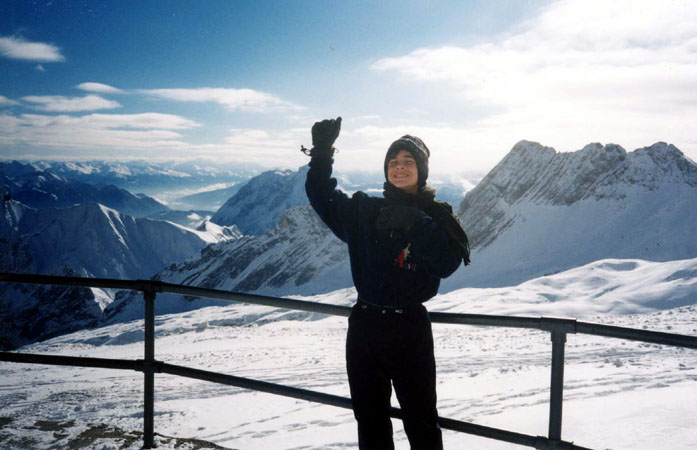
Luke atop the Zugspitze, the highest mountain in Germany. After eating our breakfast (fully clothed) and buying Luke some warm pants, we walked back to Garmisch, under the train station, and boarded the Zugspitzbahn. It winds up, up, up, past Alpine meadows and snow-glazed firs, and near a deep blue lake you switch to a trolley-car which takes you the rest of the way up to the peak. Roughly the last third of the ride is through a solid rock tunnel.
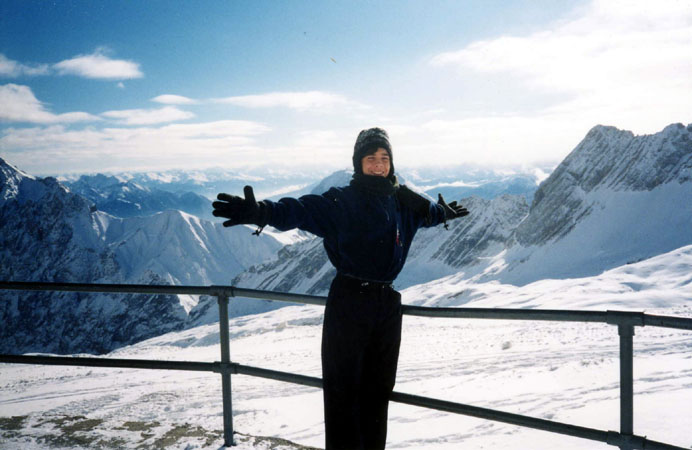
He had a blast up here. Photographs, at least with my 35 mm Idiot-Cam, can't contain the Alps. There's a monumental scale that doesn't come across in film.
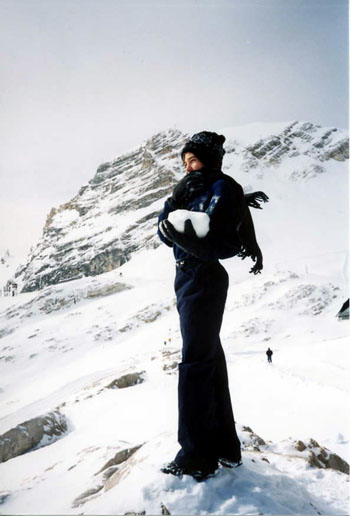
The iceman. Luke now boasts that he "fell of the tallest mountain in Germany," which is more or less true.
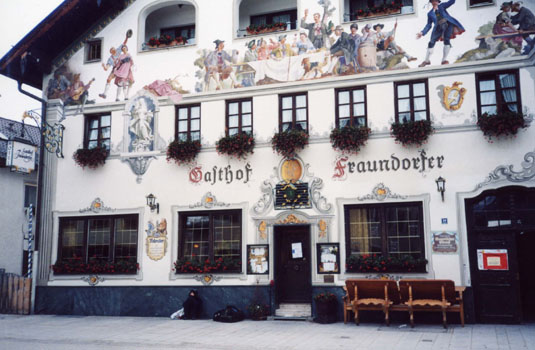
Farewell to Bavaria. Waiting for the cab to take us to the station to begin the invasion of Italy. By now, we're speaking to people in a bastard lingo of Franglish and junior high school German. Some words just make more sense in some languages. German Entschuldigung doesn't sound politely remorseful. Pardon does. So even in Germany, when I need to get past someone, I find myself saying pardon.
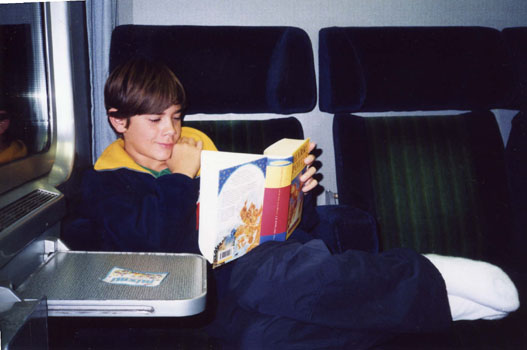
Ah, the pleasures of traveling first class. The ride from Garmisch to Innsbruck is as wildly beautiful as I remember it from when I lived up in the mountains here in 1979. You hug the side of a range, high up among the pines. Villages and towns sail past far below, and across the long valley you see huge peaks piled on peaks, like a train wreck of continents. But the ride down from Innsbruck to Verona was the most fascinating. The tracks paralleled a pure blue-white Alpine river through the Dolomites, limestone domes and wedges covered in fir, and back beyond them still we had many glimpses of the high Alps, blinding white in sunlight against the yellow-brown of the lower mountains.
Coming down through the old South Tyrol, there are more castles than anyplace else I've been. This was the medieval trade and invasion road between Germany and Italy. South Tyrol claims to have more castles than any other area in Europe.
Then we rode into Venice through some of the dreariest industrial landscape this side of Camden: petrochemical complexes built by Mussolini on the lagoon coast at Porto Marghera.
The Italian countryside is dotted with ruins. Not Roman ruins, but recent ones of what looked like once-sturdy brick villas that had been allowed to drop their rafters and let their stones fall. I wonder if this is connected to what I read about the Italian birthrate being so low.

Luke's interpretation of me outside the restaurant in Venice where we had a great lunch. All the Italians got off the train at Padua, and we rode into Venice with just a handful of Japanese tourists. At the height of its power Venice counted more than 200,000 inhabitants. In the 1950s there were 170,000. Today the city counts no more than 65,000 and some alarmists estimate the real figure for the permanent population at around 40,000.

Luke strolls along the Grand Canal. OK, he's mostly IN the Grand Canal. But it's Luke. So what do you expect? Venice is harder to navigate than Luke's bedroom, and I despaired of finding the hotel I had picked out, so we took the first one that loomed up in front of us, the "Hotel Basilea," which turns out to be nice but pricey and full of French tourists. The halls and even rooms are all floored in marble. It's classy, but it makes the place as noisy as a train station. And apparently no one in Europe with the possible exception of the Germans has managed to build a hotel where someone taking a shower upstairs doesn't sound like Niagra Falls. Accordion music floats by on a gondola outside our window. Stray dogs howl along, or bark in waltz time.
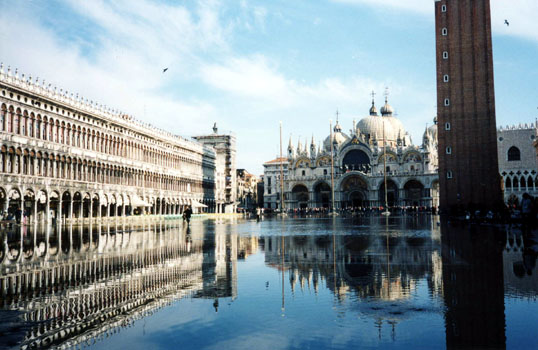
Venice is in bad shape. High tide waters cover the piazza and flood the shops along it ...
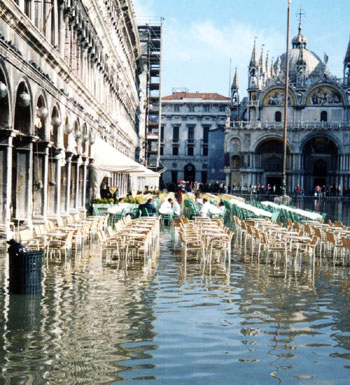
... while the waiters from the cafes kick back and wait for the water to recede so the flood of tourists can resume.
Luke talked to a gondolier who showed him how high the tides get in November, when waters frequently flood the lower parts of Venice. It's not as bad as 1966 or 2000, but the floods are more frequent now and take place 40 times a year. There's a big ambitious plan to put up a submersible sea-barrier wall, but it's mired in environmental studies and opponents say it will be too costly and do too little. So nothing is done.
Local people wear wading boots, while tourists walked on passerelle, piles of planks and trestles, like long serving tables. And this was a fairly mild flood, probably only a meter over sea level. At a mere 1.2 meters above sea level, the passerelle are useless. At 1.4 meters, more than 70% of the city would be submerged. Sea level relative to land in Venice has risen 50 centimeters in the past 300 years, and global warming, whatever the cause, is going to make the city unliveable within a century.
Between the floods and the dwindling population, someone has suggested setting up an entrance gate and charging tourists a handsome fee to visit "Venice Land."
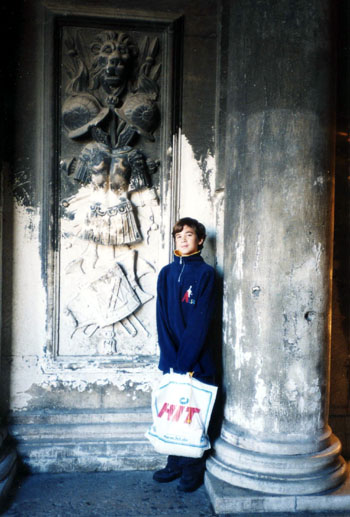
Luke in Venice.
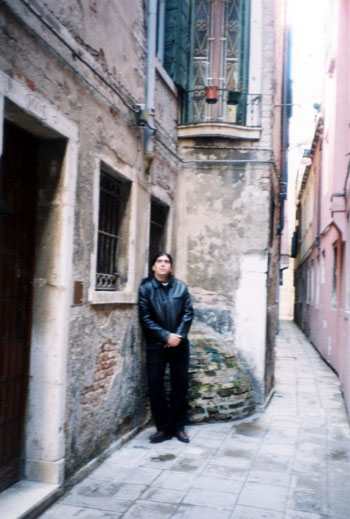
Doug in Venice, all European looking. Don't laugh; it worked. Within fifteen minutes of straggling off the train at Paris Bercy station, three French people asked me for directions or information. I had to smile and give them "je ne parlais." Their crestfallen look testified to the shock of realizing that their Yankee-radar had failed.
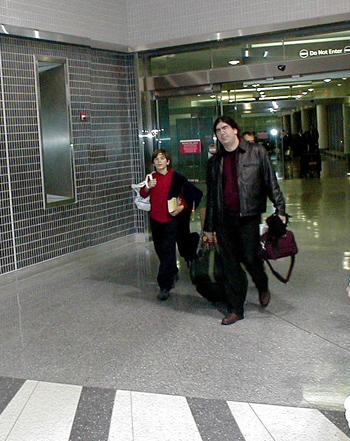
Back in Philadelphia International, after being delayed on the runway in Frankfurt for three hours when an engine wouldn't start, then being forced to troop out of the plane and aboard a double bus, which took us (I kid you not) 50 yards on the runway to a second plane, then spending another 8 hours in the air, then taking off our shoes again for customs, we finally arrive home, considerably more bedraggled than at the outset, but much wiser and with heads full of memories and suitcases stuffed with laundry.
INDEX - AUTHOR
